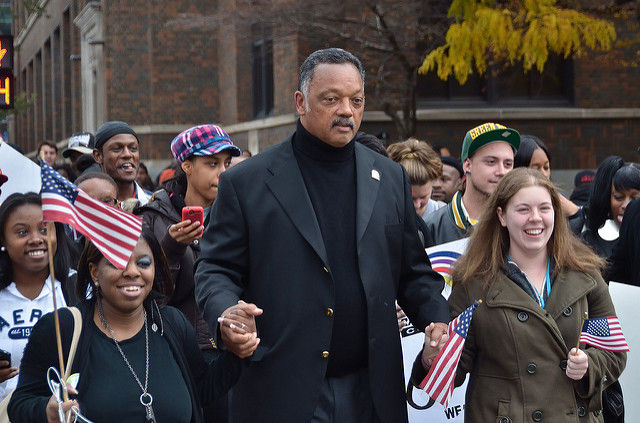
The ongoing legal drama between Apple and the Federal Bureau of investigation has largely been characterized as an Internet privacy and security issue—and a constitutional one, too. It's also been characterized as a human rights issue. Now, the Rev. Jesse Jackson says it's about civil rights.
Clearly, the security, privacy, and human rights aspects of the fight are all somewhat connected to civil rights.
But Jackson's letter to the judge overseeing the legal battle between the tech giant and the federal government has put his own spin on the hot-button topic.
Jackson, the president and founder of the Rainbow PUSH Coalition, wrote (PDF) Magistrate Judge Sheri Pym of Riverside Federal Court, urging her to side against the government:
Dr. Martin Luther King would often say, "Where we stand in times of controversy is a measure of our character. Some leaders follow opinion polls. Others stand up for their principles, refuse to compromise and mold opinion."
In these difficult times, the government, courts and private companies must stand up and uphold—however unpopular—our First Amendment rights, our right to privacy and basic individual freedoms guaranteed to us under the US Constitution.
Other writers will weigh in on the intricacies of technology and privacy rights. What I want to bring to the forefront of this legal debate is the impact and implications this case has on civil rights and our historic civil rights movement.
This case cuts right to the heart of our right to live free from unwarranted government surveillance. It is a matter of deep personal concern to me—given the past and present illegal and unwarranted spying and surveillance of civil rights organizations, much conducted under the guise of national security.
Jackson spoke of the FBI infiltrating the Southern Christian Leadership Conference, the wiretapping of King, and how the FBI's COINTELPRO "campaign spied on, infiltrated, and disrupted domestic civil rights and political groups. Rainbow PUSH Coalition and I personally have been subject to spying and surveillance, and more recently, there have been accounts of surveillance of the Black Lives Matter movement and activists."
"If the government prevails against Apple, it is my fear that it will accelerate—and make easier—government efforts to 'hack' into legitimate activities of civil rights organizations and activists," Jackson said.
The FBI wants Apple to assist the authorities in unlocking the iPhone used by Syed Farook, one of the two San Bernardino shooters who killed 14 people in a terrorist attack in December. The FBI is demanding that Apple create software to help it bypass the passcode lock to enable the authorities to gain access to the encrypted iPhone. Apple is fighting Pym's order compelling it to do that. Oral arguments are set for March 22 in federal court, where Apple hopes to change the magistrate's mind.
The government claims that a 1789 law known as the All Writs Act allows judges to issue orders despite there being no law on the topic.
reader comments
78